Do you remember the sweet scent of blooming flowers from your childhood? For many, the Black Locust tree (Robinia pseudoacacia) isn’t just a plant; it’s a nostalgic part of home, tied to childhood memories and backyard adventures.
Beyond its sentimental value, the Black Locust offers surprising health benefits. Its delicate flowers aren’t just beautiful; they can also boost your health in unexpected ways. But be cautious: parts of the tree can be toxic if not used properly.
Let’s explore how this tree is making a comeback in both kitchens and medicine cabinets.
Whispers of Spring and Hidden Dangers
In springtime memories, the Black Locust tree often emerges as a symbol of delicate beauty and subtle sweetness. Its cascading white blossoms exude a fragrance that beckons both the young and the young at heart.
Many recall the simple joy of tasting these flowers straight from the branch, their flavor reminiscent of sweet green peas with a hint of floral nectar.
These edible blooms have even found their way into culinary creations, such as syrups and jellies, capturing the essence of spring in a jar.
Yet, beneath this gentle allure lies a cautionary tale. While the blossoms invite indulgence, the rest of the Black Locust tree, its bark, leaves, and seeds harbor toxic compounds known as toxalbumins.
These substances pose risks to both humans and animals, leading to symptoms ranging from gastrointestinal distress to nervous system disorders upon ingestion.
This juxtaposition serves as a poignant reminder of nature’s duality, where beauty and danger often reside within the same branches.
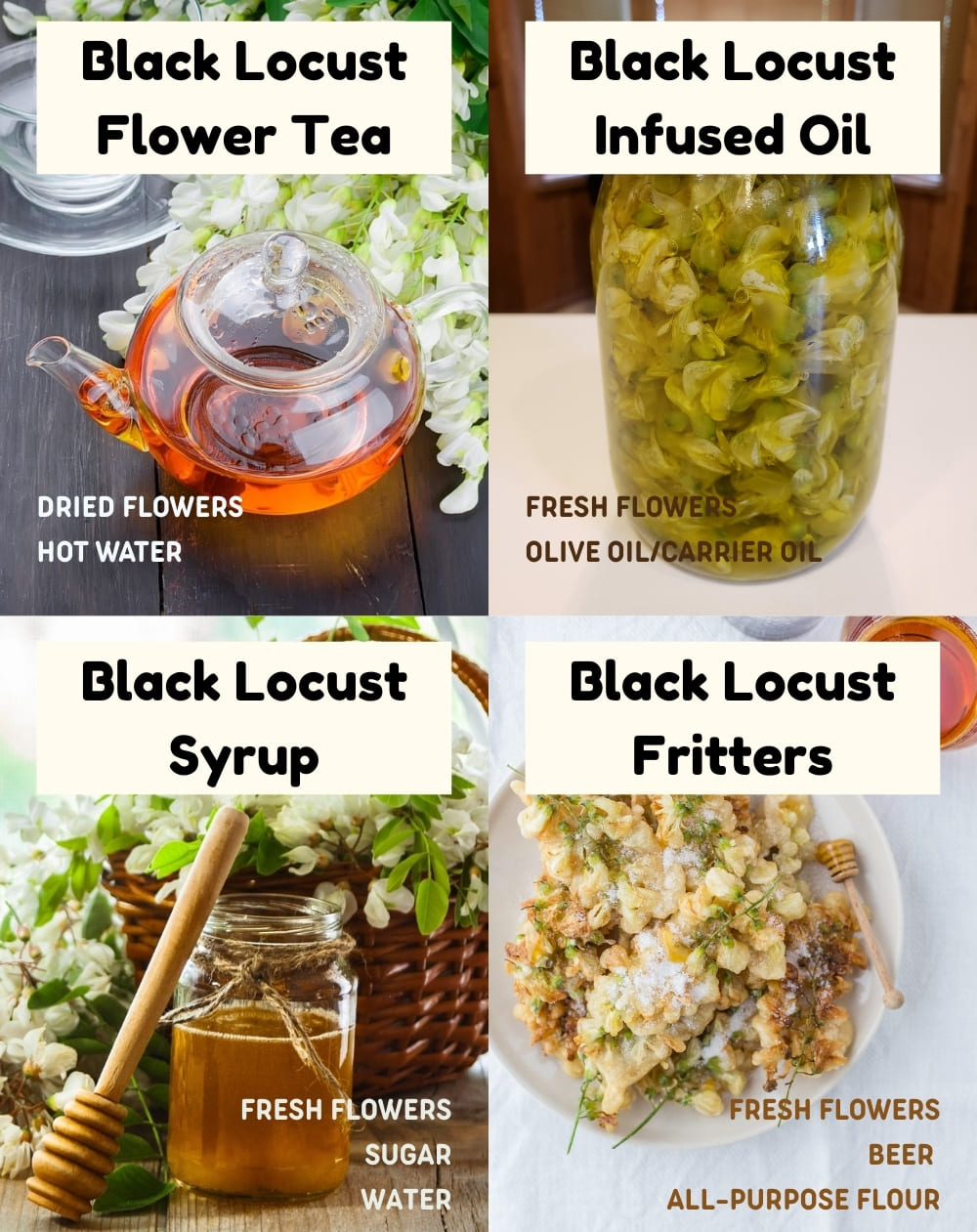
Hidden Delights of Black Locust
1. Contains Potent Antioxidants
Black Locust flowers are packed with antioxidants that can help protect your body from oxidative stress. These antioxidants, primarily flavonoids, work to neutralize free radicals that damage cells and accelerate aging.
According to a study on plant-based antioxidants, Black Locust flowers have shown high levels of flavonoids, which help reduce inflammation and promote overall health.
Regular consumption can help reduce signs of aging and protect against chronic diseases.
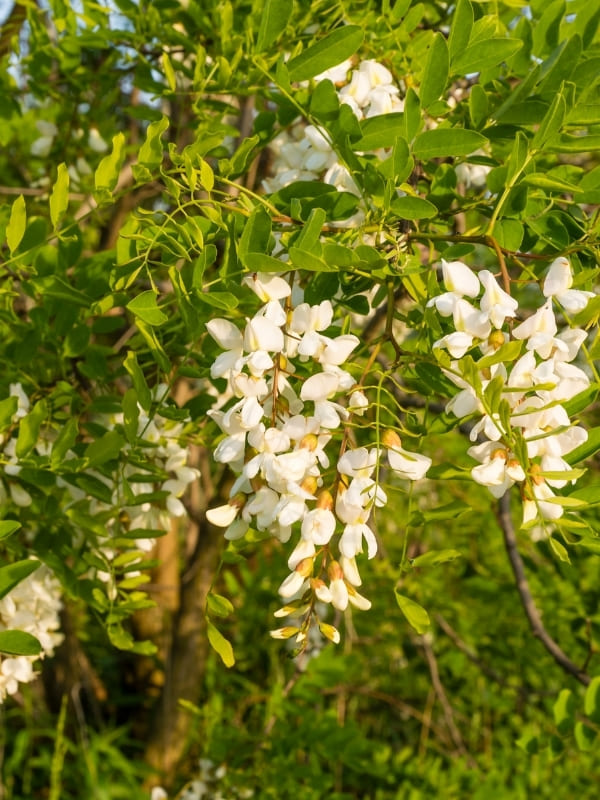
2. Supports Respiratory Health
Black locust flowers have been traditionally used to relieve respiratory discomfort, including coughs, congestion, and throat irritation. Flavonoids and saponins present in the plant help soothe inflamed airways and clear mucus.
A study published in the Journal of Herbal Medicine found that plant-derived flavonoids could significantly reduce symptoms of bronchitis and asthma.
Herbalists recommend consuming black locust flower tea for a calming effect on the respiratory system, particularly during allergy season.
3. Aids in Skin Care
If you’re looking for a natural way to soothe skin irritation or inflammation, Black Locust may be the answer. The tree’s flowers contain anti-inflammatory properties that can help reduce redness, swelling, and discomfort.
A study published on plant extracts for skin healing revealed that Black Locust flowers can improve skin appearance and relieve conditions like eczema and minor rashes.
Topically applied, this remedy can calm irritated skin, offering a gentle alternative to chemical-laden creams.

4. Helps Relieve Pain
Black Locust isn’t just a pretty tree; it’s a natural pain reliever. The flowers contain compounds that help reduce pain and inflammation.
Research suggests that certain alkaloids found in the tree have analgesic properties, making them effective for treating joint pain, muscle soreness, and even headaches.
A tea made from Black Locust flowers or an infused oil can provide soothing relief for those experiencing chronic pain. A few weeks of regular use might make a noticeable difference.
5. Promotes Digestive Wellness
A lesser-known benefit of Black Locust is its ability to aid digestion. The tree’s flowers contain compounds that can stimulate the digestive system and relieve discomfort from bloating or indigestion.
Research has indicated that plant-based tannins in Black Locusts help regulate bowel movements, prevent constipation, and promote healthy gut bacteria.
Regular consumption can help keep your digestive system running smoothly, making it an excellent natural remedy for those with digestive concerns.

6. May Help Regulate Blood Sugar
Early research suggests that compounds in black locusts may assist in stabilizing blood sugar levels.
Flavonoids and polyphenols have been shown to improve insulin sensitivity and reduce glucose absorption, making them beneficial for those managing diabetes.
An Evidence-Based Complementary and Alternative Medicine study noted that certain plant-based antioxidants help regulate blood sugar by influencing glucose metabolism.
While more research is needed, adding black locust tea to a balanced diet could support metabolic health.
How to Use Black Locust for Maximum Benefits
1. Black Locust Flower Tea
Black locust flower tea is a simple yet effective way to enjoy the plant’s health benefits.
Ingredients:
- 1 tablespoon dried black locust flowers
- 1 cup hot water
Instructions:
- Pour hot water over the dried flowers.
- Cover and let steep for 10–15 minutes.
- Strain and enjoy up to two cups daily.
This tea is especially useful for respiratory health and digestion, offering a mild, floral taste with a soothing effect.
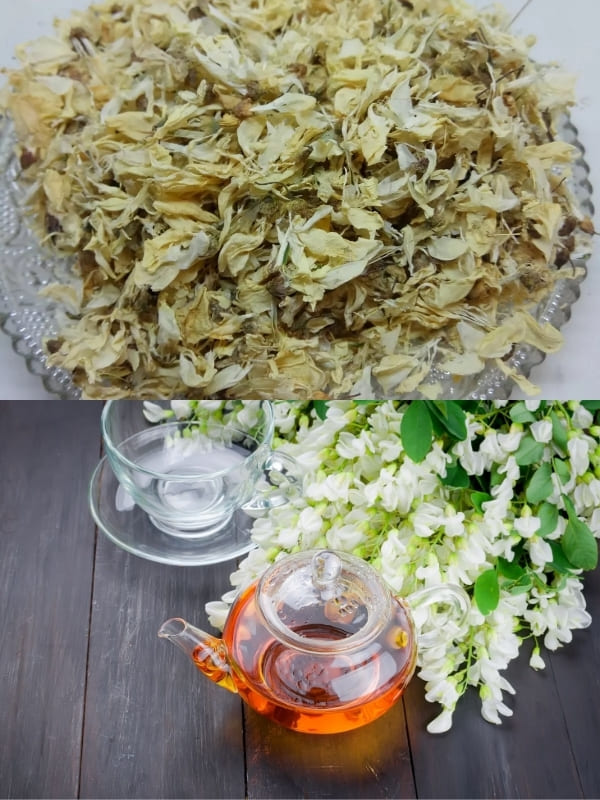
2. Black Locust Infused Oil
If you’re looking to apply Black Locust directly to your skin or use it for pain relief, making an infused oil is an excellent option. Here’s how to create it:
Ingredients:
- Fresh Black Locust flowers
- Olive oil or any carrier oil
- A clean glass jar
Instructions:
- Fill a glass jar halfway with fresh Black Locust flowers.
- Pour your carrier oil over the flowers until they are completely submerged.
- Seal the jar and place it in a warm, sunny spot for 4–6 weeks.
- Shake the jar gently every few days to mix the flowers with the oil.
- Strain the flowers out after 4–6 weeks and store the oil in a dark glass bottle.
- Use this infused oil on sore muscles or skin irritations or as a gentle massage oil.
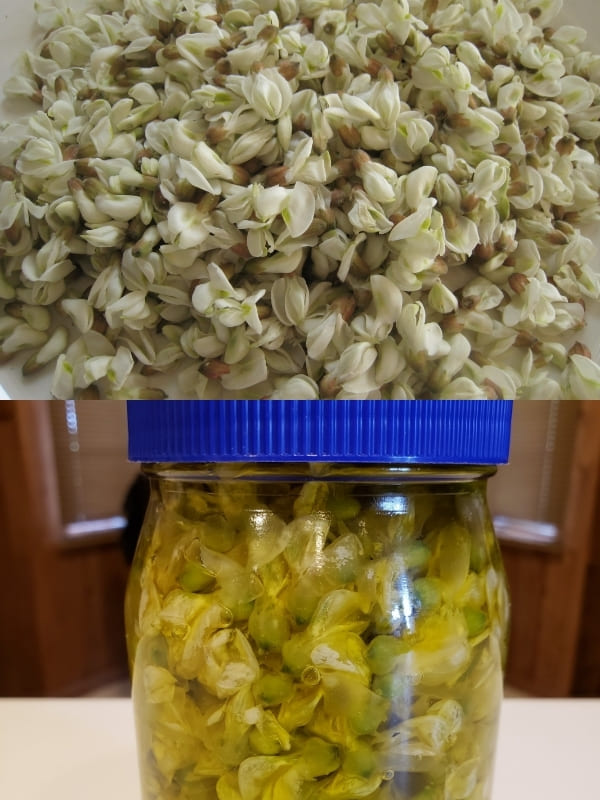
3. Black Locust Syrup
A fragrant syrup perfect for drizzling over pancakes, waffles, or adding to beverages.
Ingredients:
- 50–75 Black Locust flower clusters
- 1 kilogram (2.2 pounds) sugar
- 1 liter (1 quart) water
- 20 grams (4 teaspoons) citric acid
Instructions:
- Gently rinse the flower clusters to remove any insects or debris.
- In a large pot, bring the water to a boil. Add the sugar and stir until fully dissolved.
- Remove from heat and stir in the citric acid. Be cautious, as this may cause foaming.
- Allow the syrup to cool to room temperature.
- Once cooled, add the Black Locust flowers to the syrup, ensuring they are fully submerged.
- Cover the pot with a clean towel and let the mixture steep for 24 hours, stirring occasionally.
- After steeping, strain the syrup through a cheesecloth or fine mesh sieve, squeezing the flowers to extract all the liquid.
- Pour the syrup into sterilized bottles and seal tightly. Store in a cool, dark place.
This syrup can be diluted with water for a refreshing drink or used as a flavorful addition to various dishes.
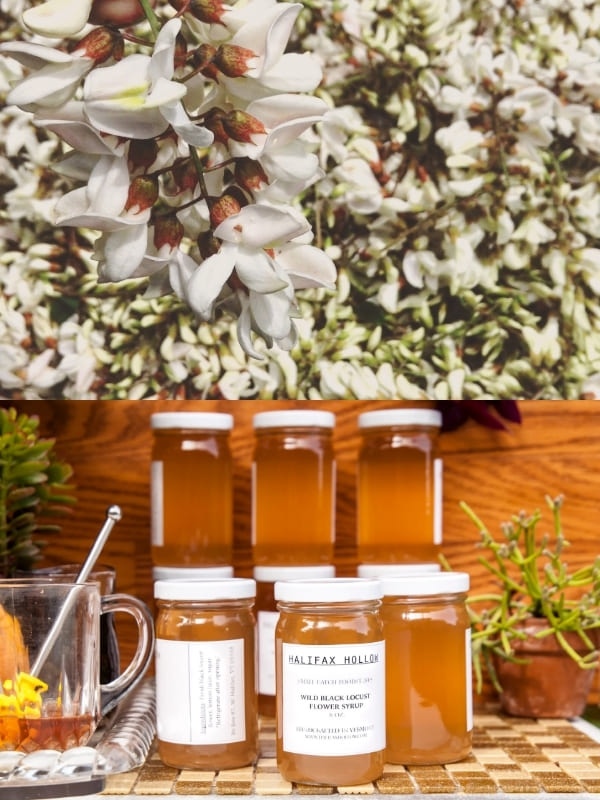
4. Black Locust Fritters
Light and crispy fritters that make for a delightful snack or dessert.
Ingredients:
- 12 clusters of Black Locust flowers
- 4 tablespoons all-purpose flour
- 1 pinch salt
- 1 tablespoon sugar (plus more for sprinkling)
- 50 ml cold beer (or sparkling water)
- 100 ml water
- 500 ml vegetable oil for frying
- Honey or powdered sugar for serving (optional)
Instructions:
- In a bowl, whisk together the flour, salt, and sugar.
- Gradually add the cold beer and water, mixing until a smooth batter forms.
- Heat the vegetable oil in a deep pan to 175°C (347°F).
- Hold each flower cluster by the stem and dip it into the batter, ensuring an even coating.
- Carefully place the battered flowers into the hot oil, frying until golden brown (about 2–3 minutes).
- Remove with a slotted spoon and drain on paper towels.
- Serve warm, sprinkled with sugar or drizzled with honey if desired.
These fritters offer a unique floral flavor and are best enjoyed immediately after frying.
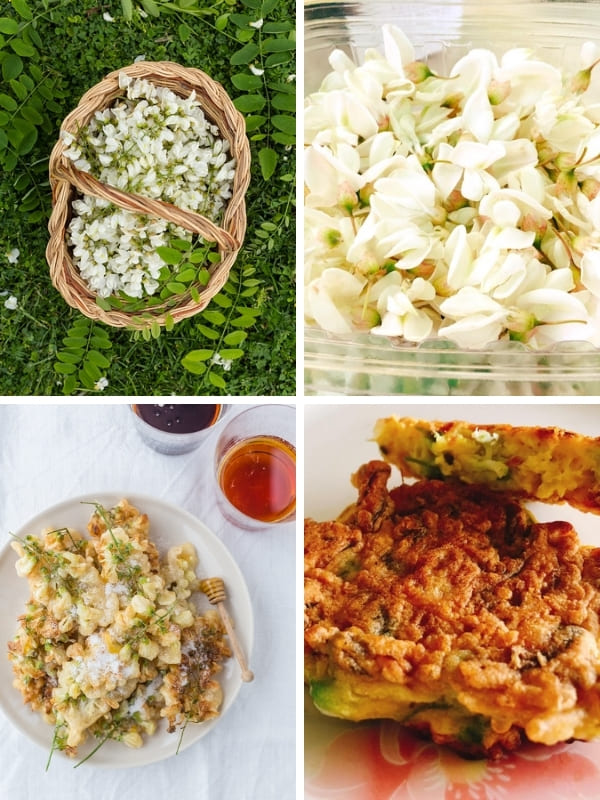
5. Black Locust Flower-Infused Honey
A sweet, floral-infused honey perfect for teas, baking, or as a spread.
Ingredients:
- Fresh Black Locust flowers
- Raw honey
Instructions:
- Gently rinse the flowers to remove any insects or debris and allow them to dry completely.
- Fill a clean, dry glass jar loosely with the flowers.
- Pour raw honey over the flowers, ensuring they are fully submerged.
- Seal the jar tightly and place it in a warm, sunny spot for 1–2 weeks to infuse.
- After the infusion period, gently warm the honey to make it more fluid (if necessary), then strain out the flowers using a fine mesh sieve or cheesecloth.
- Transfer the infused honey to a clean jar and store it in a cool, dark place.
This infused honey captures the delicate essence of Black Locust flowers and can enhance a variety of dishes and beverages.Note: Ensure that the Black Locust flowers are correctly identified and free from pesticides or contaminants before use.
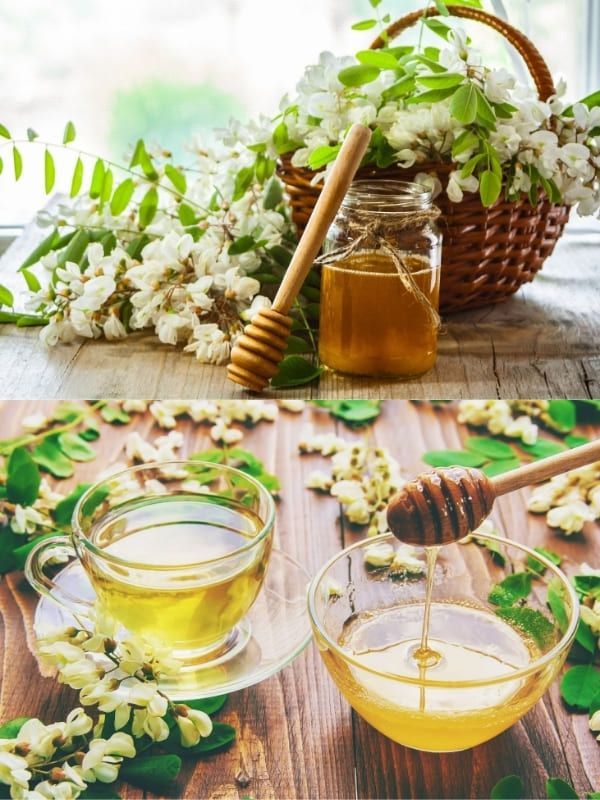
Cautions and Precautions
While black locust flowers have beneficial properties, other parts of the tree, including leaves, seeds, and bark, can be toxic if ingested improperly.
These toxic parts can cause nausea, vomiting, and other health issues. Always use Black Locust flowers with care, and consult a healthcare provider before incorporating it into your routine.
Pregnant and breastfeeding women should avoid black locust remedies due to limited safety research. People with known allergies to plants in the legume family should avoid Black Locust, as they may experience allergic reactions.
If you’re trying it for the first time, start with a small amount and observe for any adverse reactions. Always ensure you’re using only the flowers, as other parts of the tree can be harmful.
Disclaimer
This article is for informational purposes only and is not a substitute for professional medical advice. Always consult with a healthcare provider before using herbal remedies, especially if you have underlying health conditions.
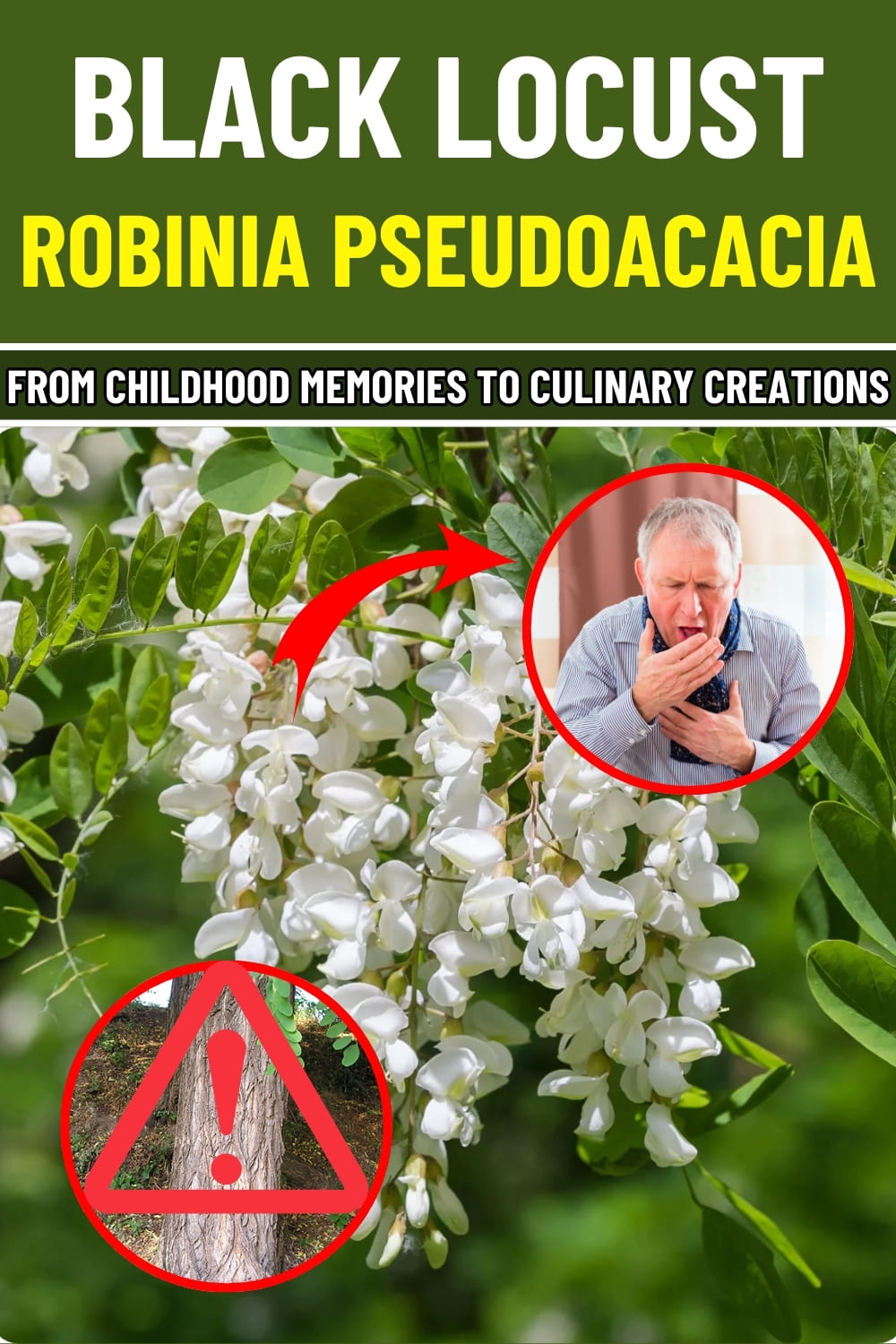
Uncover the Hidden Delights of Black Locust: Health Benefits, Childhood Memories, and Culinary Creations
